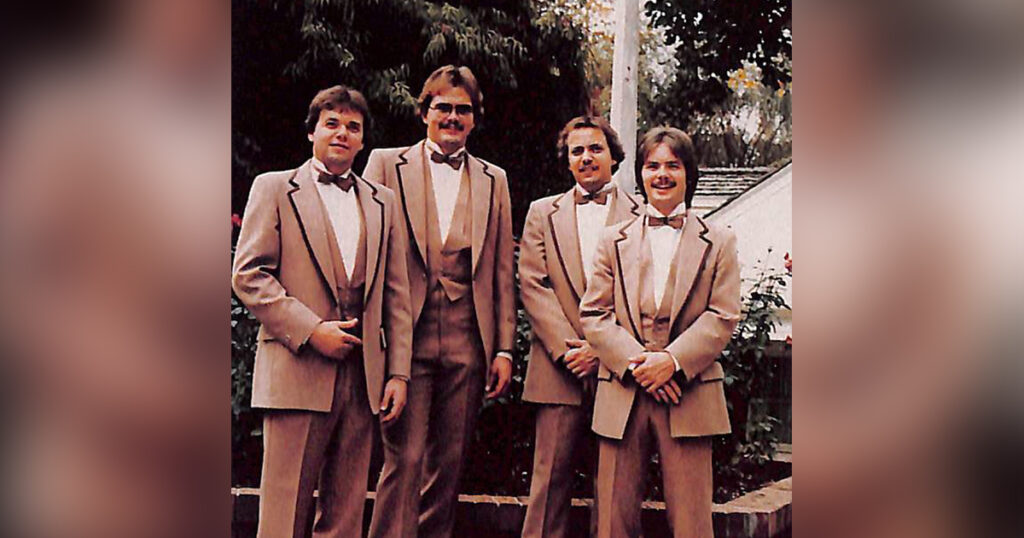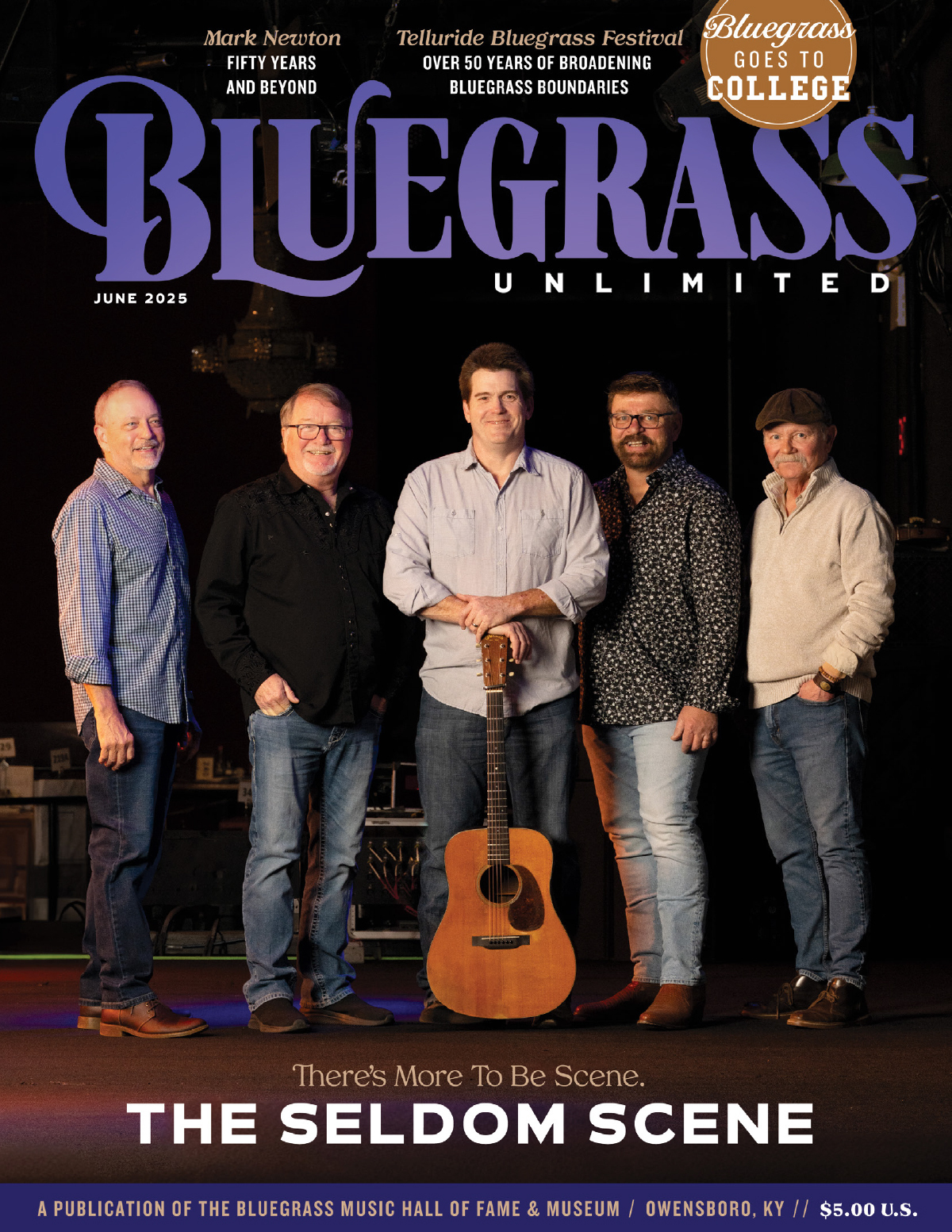Home > Articles > The Archives > The Virginia Squires — Show Band Extraordinary
The Virginia Squires — Show Band Extraordinary
Reprinted from Bluegrass Unlimited Magazine
January 1985, Volume 19, Number 7
In terms of superior musicianship, highly skilled vocal arrangements and broad audience appeal, the Virginia Squires are absolutely unsurpassed as a contemporary bluegrass show band and a tough act to follow in any musical environment.
Members of the Virginia Squires describe their music as ‘contemporary bluegrass.’ While it is descriptive, the term falls far short of capturing the dynamic energy, showmanship and virtuosity exhibited by what is unquestionably one of the swinginest, pickinest, outfits ever to come on the bluegrass scene.
Given the far-flung reputation of the state of Virginia for producing top musicians, it should come as no surprise to learn that all the band members have deep roots in the historic and beautiful Old Dominion State. In addition, each has a background in country and bluegrass music dating to boyhood days.
Mark Newton, Sammy Shelor, Ronnie Simpkins, Ricky Simpkins and Don Grubb were working as the Heights of Grass when Grubb decided to enter private business as proprietor of a music store. The four remaining entertainers continued in music, reorganizing almost immediately on May 1, 1983, as The Virginia Squires. “Our booking agent in Richmond, Al Hopper, came up with the new band name,” says Ricky Simpkins. “He had booked a few jobs for us before we got organized good and he had to have a name to put on the contracts, so he used the Virginia Squires.” At this point Mark Newton confessed: “We hated it at first to be perfectly honest with you. It hit us like a ton of bricks. It began to grow on us though and we liked the name better and better as time went on. It has a touch of class and it fits the image that the public seems to have of the state of Virginia.”
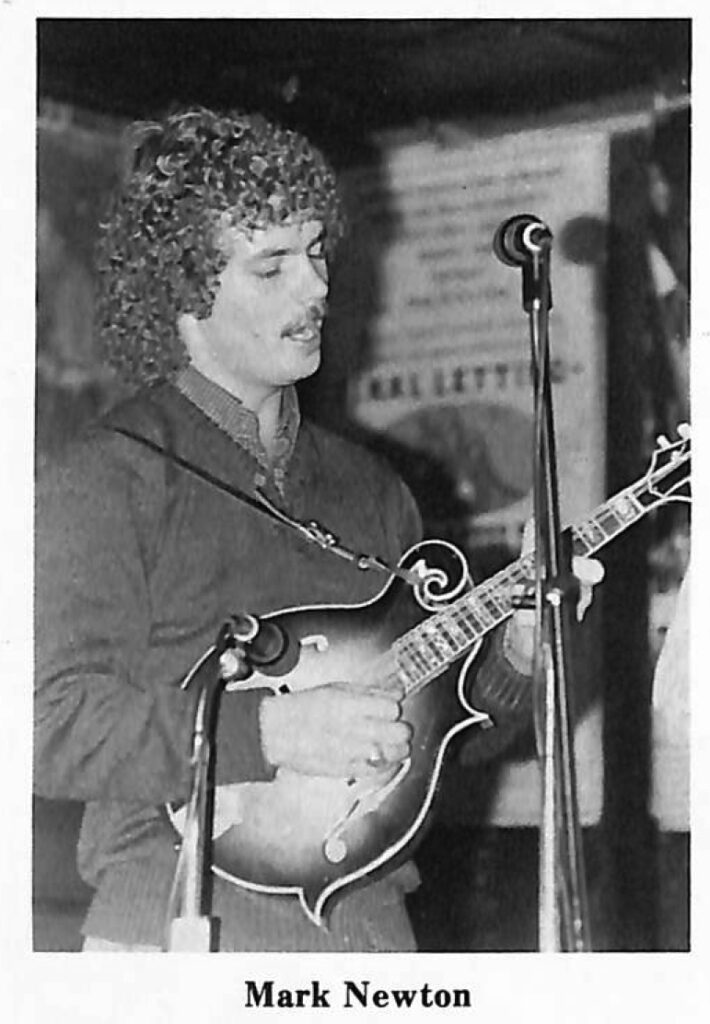
The members of the Virginia Squires are impressive in many ways other than their youthful good looks, impeccable stage dress and erect posture that seems to suggest a quiet, unassuming confidence in the ability to live up to the already considerable reputation of the unit. A few minutes spent listening to a backstage rehearsal session will impress the most critical observer, regardless of musical tastes. From the first solid downbeat to the final note, the timing is as even as a metronome. The vocals are smooth but not slick and the musicianship—both collectively and individually—is awesome. Each plays to complement the vocals or the lead instrument and does so in the casual, offhand manner of the gifted musician with a deeply inbred talent.
Mark Newton was reared in his father’s hometown of Fredericksburg, Virginia. He played in his father’s band and later was with a fine bluegrass band called Cabin Hill for about a year. A guitar player up to that point, he joined Heights of Grass in 1978 playing mandolin. After nine months he left for a stint with the Knoxville Grass and then a music store job in Knoxville before returning to the Heights of Grass, continuing until the group disbanded. An exceptional mandolinist who can hold his own with the best, he now once again plays rhythm and lead guitar with no less capability. Sharing the lead vocal work about equally with Ricky Simpkins, Newton does all the tenor singing and high lead. His is the classic lonesome tenor voice that is reminiscent of some of the storied greats and Newton uses it most effectively. He also does the MC work on stage, saying just enough but not too much, with the result that the pace of the show is kept upbeat at all times. Offstage, his outgoing, soft spoken and friendly manner reflects his old line east Virginia upbringing.
Brothers Ronnie and Ricky Simpkins were lifelong residents of the Christiansburg-Radford, Virginia area until moving to Richmond when they joined the Heights of Grass; Ricky in February, 1982, and Ronnie five months later. Like Mark Newton and Sammy Shelor, they remained with Heights of Grass until the group disbanded in April, 1983. Also like Mark and Sammy, both have played country and bluegrass music for as long as they can remember.
A superbly gifted musician, Ricky plays expertly any instrument used on stage by the band, as well as what he calls a “little” piano. He recalls: “I started when I was just a small boy listening to the early morning Flatt & Scruggs radio shows from WSM in Nashville and Reno & Smiley’s ‘Top ‘O The Morning’ TV show from Roanoke at six in the morning. I used to get two pieces of kindling wood and use one like a bow and pretend I was playin’ the fiddle just like they did on radio and television. I got a fiddle for Christmas when I was 6 1/2 and that’s when I started.” Probably the most cherished memory that Ricky has is a night when he was nine years old and Flatt& Scruggs played the National Guard Armory in Christiansburg. Ushered backstage with his fiddle, Ricky had barely begun to play an “audition” tune when Earl Scruggs stopped him and said ‘that’s fine.’ A little later the lad was brought on stage and introduced by Lester. His rendition of “Bile ’Em Cabbage Down” earned him a gratifying applause and young Ricky was permanently and irrevocably hooked on show business.
Ricky now shares the lead vocal duties with Mark Newton and also divides his time about equally on stage between playing mandolin and fiddle.
“I started out on the mandolin, believe it or not, when I was about five,” says bass player Ronnie Simpkins. “I played with mom and dad at fiddlers’ conventions. After dad’s death I lost interest for a while and then took up the bass when I was about twelve. Ricky, myself, momma and our sister Tammy—she played the mandolin—had a band. Then Ricky and myself formed Upland Express, a five-piece band and we recorded an album for Leather Records.”
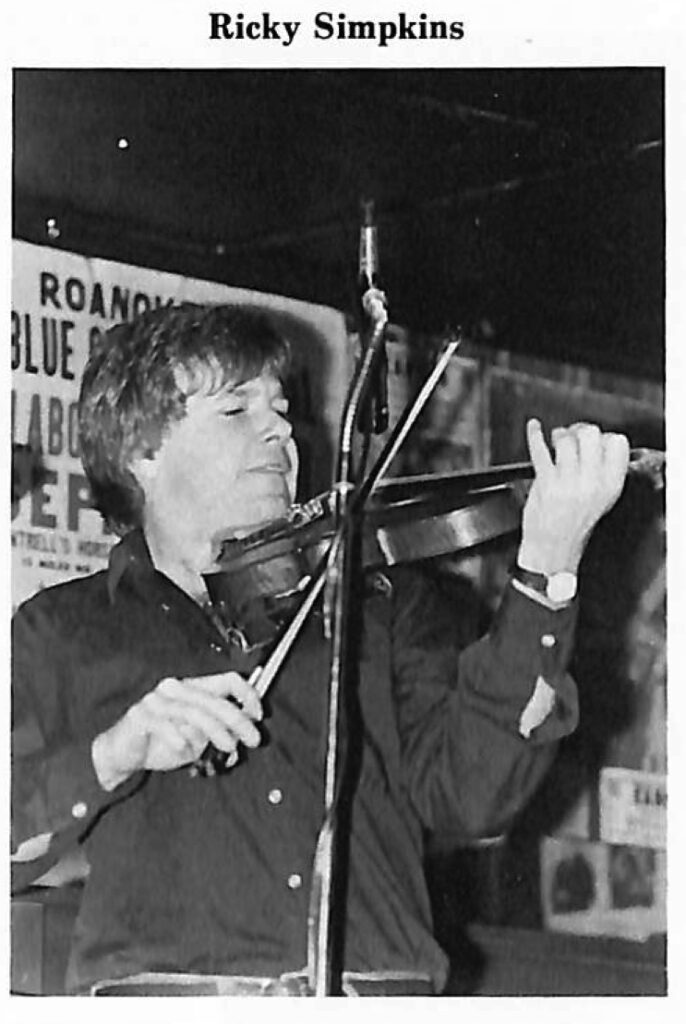
After Upland Express disbanded, Ricky worked with the McPeak Brothers until joining the Heights of Grass, while Ronnie played bass with the Bluegrass Cardinals from July, 1980, until September, 1981. Ronnie now sings bass in the quartets. His playing the electric bass right on top of the beat supplies the driving force and “punch,” without which the band’s exciting music would carry substantially less impact.
Although he doesn’t have a lot to say, Sammy Shelor’s contributions to the band are tremendous. Both his grandfather and great grandfather worked with the late Charlie Poole, a noted old-time bandleader and recording artist of the 1920s era. “My grandfather influenced me more than anybody,” he says. “He played banjo for 30 years and quit for a while but started back when I was about four. When I was five he made me a banjo from a pressure cooker and I got my first real banjo the next year. I was influenced a lot by the band style of Boone Creek. For a long time I’d played old-time music with my grandfather but I was using a (three-finger) roll. I got away from the banjo for a while and played mandolin with the Dominion Bluegrass Boys for over a year but when I came with the Heights of Grass in October, 1981, I was playing banjo again.”
A native of Stuart, Virginia, Sammy also plays guitar, bass and “you ought to hear him play mandolin,” volunteers Ronnie Simpkins enthusiastically. Blessed with a great right hand, Shelor’s banjo work is smooth as silk but he obtains the tone and drive that spearheads the straight-ahead, free-wheeling spirit of the Virginia Squires’ music. He sings baritone in the group’s vocal harmony arrangements.
Keenly aware of the necessity of obtaining above average song material for their recordings and stage offerings, the band members have gone to the modern country field with such as “The Devil Went Down To Georgia” and “Come Early Morning.” “What we’re trying to concentrate on is original material,” says Shelor. To which Ricky Simpkins adds: “Our new album has such songs as ‘No Expectations,’ ‘The Sweetest Song’ and ‘Twenty One Miles,’ [the latter] written by Randall Hylton. Sonny Ludlam in Fredericksburg wrote four of ‘em for us and one was written by Larry McPeak.” With the first album completed, thoughts are beginning to turn to a follow up issue. “Singing the quartet songs has been a real treat for us,” says Newton. “We enjoy doing that sort of thing and I think we’re possibly doing more of it than most bands other than a few established groups.” “We have plans to record a gospel album,” adds Shelor, “if not the next time then we will for the third album. We’re working on quite a bit of high lead stuff now. It works good with the people that we have and it gives the trio a good strong sound.”
One of the most fortunate things to happen for the band was acquiring the friendship and help of Sonny Osborne while working as members of the Heights of Grass. A few words from an artist of Osborne’s stature can carry tremendous weight in recommending a group and he was instrumental in placing Heights of Grass and later the Virginia Squires on a national tour for Music Unlimited as opening act for the Osborne Brothers. “We’ve been real close to Bobby and Sonny,” says Newton. “They’ve thrown us a lot of work and said some nice things about us and have meant a lot to us.
“I like the auditorium concerts we’ve done because you can pick out 12 or 15 of your best songs and concentrate on them,” Newton continues, “but I enjoy the festivals, too. We like to meet people and talk to them between shows.” “Our music has been well accepted about everywhere we’ve played,” interjects Ronnie Simpkins, “but maybe a bit better down south. Florida has been good for us because we worked there a lot as the Heights of Grass and we got real good response.” The last tour worked by the Heights of Grass was a southern one, culminating in a four week stint performing at U.S. military installations in the Caribbean Islands via a USA-sponsored tour.
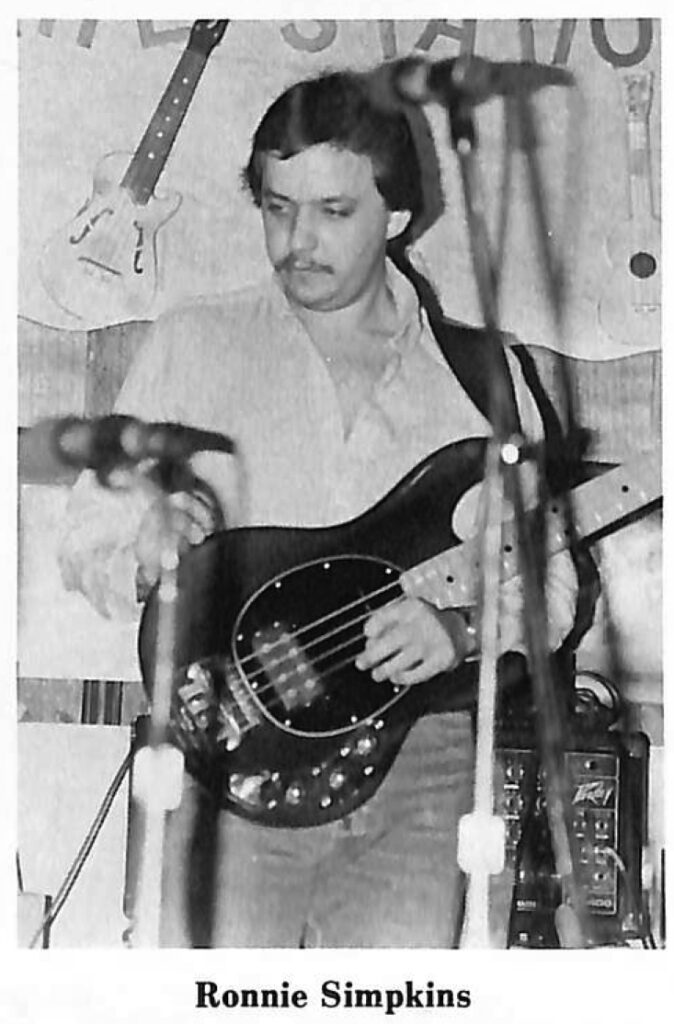
“We’ve been very fortunate in getting on as many festivals as we have even though we’re a relatively new band,” explains Mark Newton. “I attribute it partly to the fact that we’ve worked in other bands and people know us and of course Al Hopper is still affiliated with us. We first met Al with the Heights of Grass. At a club engagement he asked if it would hurt our feelings if he booked a few dates for us. He got to doing such a good job that he just took it over altogether. He’s done a tremendous job for us and he’s a close friend. It takes a special person to book show dates and Al has a way of identifying himself with the band to where we just think of him as part of the group. But he’s a successful businessman and is president of an architectural and engineering supply company in Richmond and a while before Heights of Grass was dissolved he gave up the booking. When we regrouped as the Virginia Squires though we talked him into helping us again. His wife Betty is a big help, too.”
In recalling some funny incidents that have taken place during their career, the band members explained a long time method of dealing with the club patron who yells out requests—sometimes very persistently and in a manner annoying to both the band and other customers—for a frequently used song recorded originally by another artist that most serious fans are tired of hearing done ceaselessly by every band that plays the place. ‘Top 40 bluegrass,’ they’re often called. “We’ll say ‘we don’t do that song but you’re welcome to come up and sing it,’ and that’ll usually quiet ’em down,” says Newton. “One night with Heights of Grass though we had this guy who was a whistler. So Donnie (Grubb) said ‘If you want to be part of the show why don’t you come on up here?’ And he did! He didn’t back off a bit and it took us six songs to get out of that situation. We finally turned his microphone off!”
With the unit pared down to four members, a great deal of versatility is called for. “Everybody has to put out 100%,” emphasizes Ronnie Simpkins. “We’ve tried to get everybody involved in the show. For instance, in our stage introductions Mark will introduce Ricky, who in turn will introduce Sammy and so on.” The remarkable multi-talented ability of each band member puts a great deal of variety into the show and this fact is brought home to the listener especially when Ricky Simpkins trades his fiddle or mandolin for a guitar and does some beautiful three-finger pickin’ on a gospel quartet selection or when Mark Newton takes the mandolin to offer a blazing fast version of an old Monroe standard.
The flare-bottomed, beige with dark trim tuxedos are striking as stage wear. “As we began to get feedback, we realized the fans seemed to like the suits,” explains Newton. “People would come up to us and say ‘Those outfits sure look good on you.’ I think some other bands would benefit from dressing better along the way. I know it’s sure helped us.”
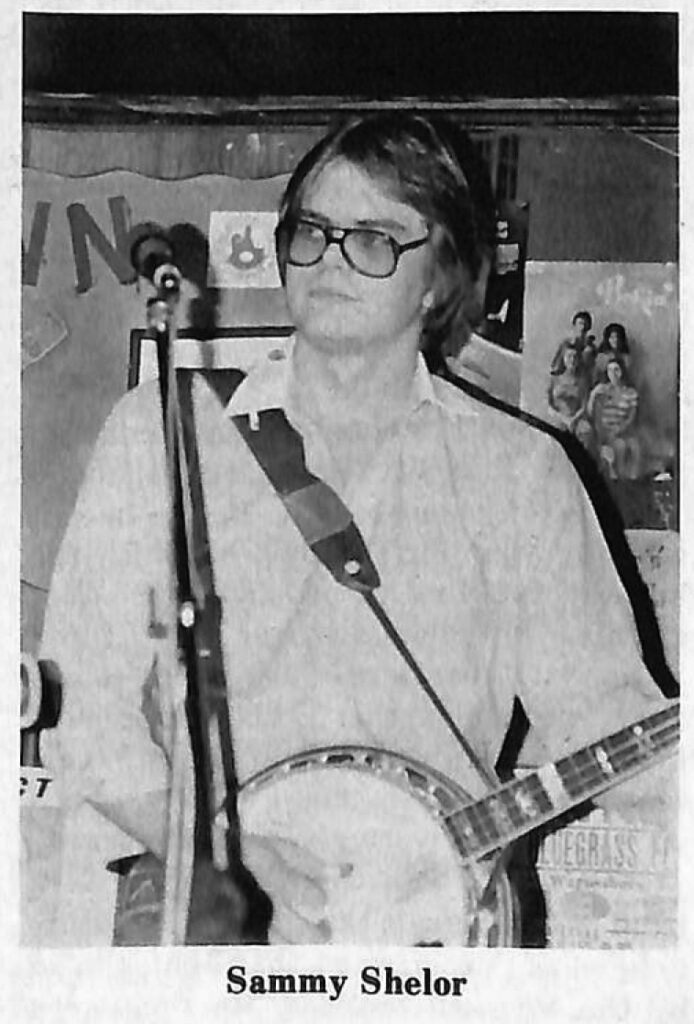
It’s a fact that there are some bands today playing very good bluegrass on a part-time basis while the band members hold day jobs. It’s also likely that somewhere there are a few bands playing the music on a full-time basis that might be rated decidedly on the low side of good but have survived because members’ wives have outside employment or there are other factors that enable the band members to eke out a living. At the same time, these bands have not made a significant niche for themselves because the cold, hard fact is that in the world of professional bluegrass music, there’s very little room at the top. Members of the Virginia Squires squared their young shoulders and put their symbolic hats in the ring at a time when the competition was at its peak and that situation hasn’t changed roughly 18 months later. It has been a building year for the unit but with the release of its first record album and a lot of miles traveled all over the United States and parts of Canada, it seems very probable that this immensely talented group would soon be a top contender for hottest group of the year if such an award were given in bluegrass.
It would be hard to conceive of a band playing music that more completely defies easy description than that played by the Virginia Squires. Its repertoire reaches several fields of music from gospel to modern and ‘outlaw’ country to hard traditional bluegrass but all within the acoustic framework and always with good taste, a high degree of expertise and a lot of audience appeal. Sammy Shelor, Mark Newton, Ronnie Simpkins and Ricky Simpkins have the talent, the class and seemingly all the other necessary ingredients to establish the Virginia Squires as a headline act of some magnitude in the not very distant future.
